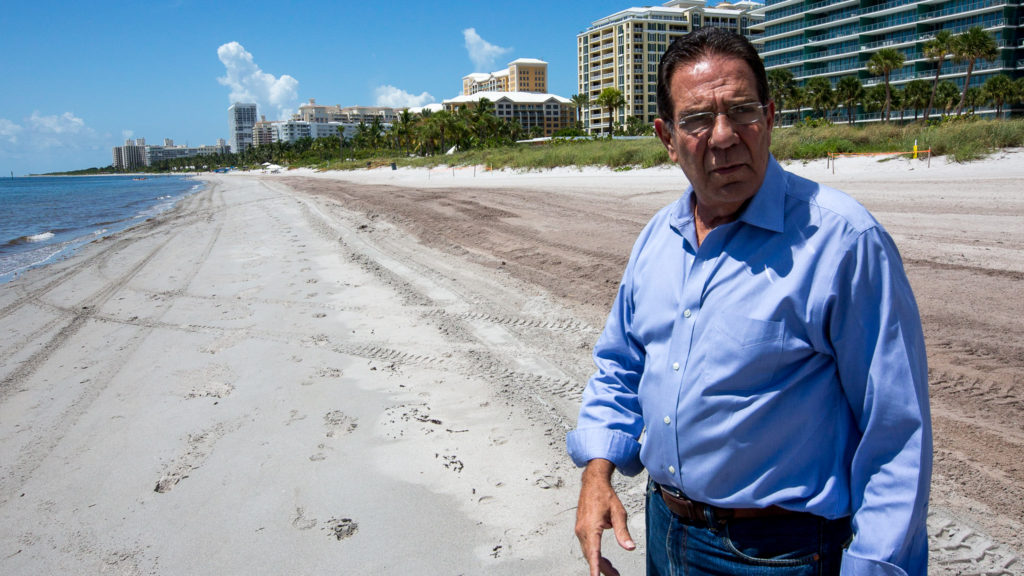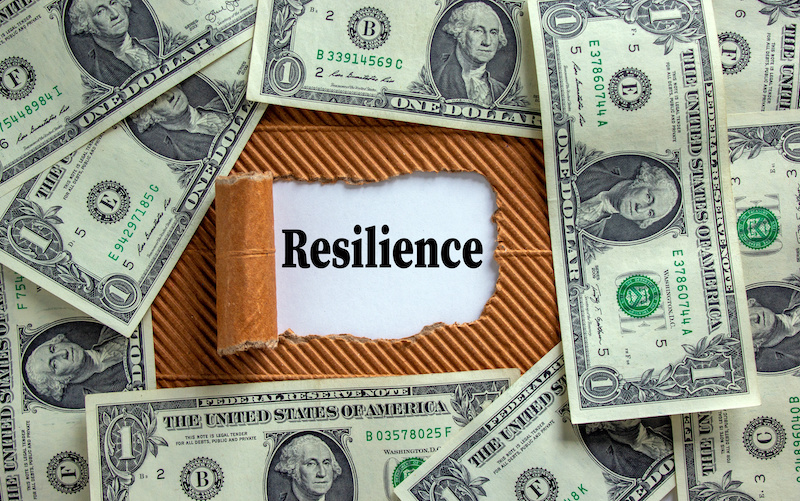Suarez: Key Biscayne’s Beaches Need Help
Tony WintonAugust 12, 2019

Miami-Dade County Commissioner Xavier Suarez looks at buried sargassum seaweed on the beach in Key Bisayne, Aug. 8, 2019. The seaweed has contributed to rotten egg smells and recent studies show that the sand itself has growing levels of fecal bacteria. (Key News/Tony Winton)
It’s been a long, tough summer for Miami’s marine environment.
Sargassum seaweed piling up on the beaches.
Bacteria in Crandon Park Beach waters, and now, bacteria in the sands of Key Biscayne.
And late last month, news that the federal government is raising new obstacles for funding renourishment of badly-eroded stretches of island beaches.
And that’s all just on the Atlantic Ocean side of the “Island Paradise,” as Key Biscayne is known.
On the other side of the island, Biscayne Bay is under growing threat of losing an entire ecosystem, according to a Miami-Dade County grand jury report last week. “A tipping point,” grand jurors said.
Standing on the beach near the Oceana condominium, the County official representing Key Biscayne pointed at mass quantities of buried seaweed and inhaled the fetid breeze.
“This doesn’t pass the smell test,” said Xavier Suarez, who is term-limited from again serving as the District 7 commissioner but who is widely believed to be eyeing a run for Miami-Dade County Mayor in 2020.
Suarez says he will look at County funding to help with seaweed removal in Key Biscayne, where the Village currently buries some seaweed and does occasional removal. Suarez also said the County should examine whether water netting might be appropriate given the health risks, even though barrier systems are being used in Mexico and other communities.
“Maybe the environmentalists would see that there is some gain, some profit in having the nets out there. And it’s not that expensive,” he said. So far, environmental regulators have given a thumbs-down to barriers.
Suarez noted another problem with the sargassum removal the County is dealing with: each haul also removes a significant amount of sand from the beach, even as Key Biscayne is trying to get included in a shoreline protection project.
The renourishment program is administered by the U.S. Army Corps of Engineers. The Village Council approved expansion of public access to beaches as the Corps sought, but now, there is a new roadblock: funding for a feasibility study.
Village Manager Andrea Agha told Council members July 22 the Corps says it only has $2 million allocated for a study that would cost $3 million. She is working with the region’s political leaders and says she’ll get on the road to Washington if necessary to push for the funds.
A Corps spokesman did not have immediate information on the holdup with Key Biscayne’s application, but acknowledged application processes can take years to complete.
On the bay side of the island, meanwhile, there were new concerns raised about the spillage of “millions of gallons of sewage directly into Biscayne Bay,” said a Miami-Dade County grand jury, which periodically issues report on matters of great public concern in addition to its work of reviewing criminal matters. The panel took testimony from a variety of witnesses about the multi-pronged threats.
“It is obvious that the health of our precious Biscayne Bay and our underground drinking water is at a state of precarious balance,” the panel wrote.
“We are at a tipping point,” the panel said, listing threats from septic tanks, pollution and cooling canals at Florida Power & Light’s Turkey Point nuclear power plant that create saltwater plumes in the underground aquifer that supplies fresh water to the County.
Meanwhile, the Health Department will be looking at new tests this week to see if Crandon Park beaches can reopen for swimming. Following testing that showed high bacteria levels, red danger flags were flying and lifeguards were keeping visitors out of the water.
One visitor from Switzerland, however, took the 11-day swimming advisory in stride as he gazed out over a deserted stretch of sand Thursday.
“It’s awesome,” said Casey Bayandor from Geneva.
“I like the idea that they have detected that you shouldn’t go in the water. They took necessary action, they closed it. These things happen.”
Was he disappointed about his visit to Key Biscayne?
“Not at all. There are other beaches.”


